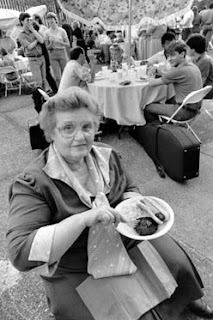I nod with apprehension. My recital at Paul Hall begins in four hours, twenty minutes, and twelve seconds. I wipe my clammy hands on the skirt my mother sewed for the event.
"Let's talk for a moment about the summer," she says, lifting a tub of Darigold cottage cheese from the coffee table. "I hope you'll attend Aspen, so that we can continue our work together. Great outdoor concerts and picnics, too."
I mutter something incomprehensible about my mother and Interlochen. The truth is, Fred Müller, my manager, has sealed a deal for a summer program. I've been awarded full scholarship to Interlochen, and that's that. Müller has convinced my mother I might be named concertmaster for the World Youth Symphony; my mother imagines her daughter following in the footsteps of Joseph Silverstein, Boston Symphony's legendary concertmaster.
"You have your mother come upstairs after the recital, OK? It'll be easier for us to discuss plans here in my studio than backstage at the hall, where I might get distracted by others."
You mean, accosted by other stage parents.
"If your mother has objections to Aspen, I need to understand her reasoning."
I force a smile. I'm aware that Dorothy DeLay has a degree in psychology as well as music, but my mother has a Ph.D in Obstinacy. No amount of analytic reasoning will change her ways.
"Are parents really allowed up here?"
"What dear?"
"You know. Isn't there some sort of, um, policy? Like, no parents allowed on the fifth floor."
Miss DeLay sets the tub of cottage cheese on the coffee table and darts a disapproving glance. "Oh, these hare-brained institutional policies, Margo. For every rule, there's an exception. Speaking of exceptions—"
I tuck the violin under my arm and distractedly etch a circle into the carpet with my bow. Somewhere I had read that Piatigorsky, the great Russian cellist, had begun one movement of a Bach Suite in a concert, and detoured into another. The week before, Robert McDuffie, Miss DeLay's prize student and not exactly a wimp, perspired uncontrollably during a performance while fighting his way through a fugal episode of Bach.
Why did I agree to this recital in the first place?
"If I'm to stick with this diet," says Miss DeLay, digging into her pocketbook and jangling coins and keys, "I'll
need chocolate. Sweetheart, here."
She crumples a couple of dollars and extends her arm.
I reopen the thick Galamian edition of Bach to examine a fingering.
"Will you bring me a candy bar from the vending machine before your next class? Make that two, actually. I'll be going all day without a lunch break."
I distractedly reach for the dollars after glancing at the notes.
"Thank you, Margaret, and keep the change."
♪ ♩ ♪
Backstage of the recital hall, I begin to warm up; the violin feels alien. I've been told to enter on stage at five minutes past the hour, allowing latecomers a grace period. I tiptoe to the stage door, hold it ajar, and frantically scan the audience. I spot my mother sitting third row center. She's fanning herself with what appears to be several concert programs. I know what she'll do with those programs; she'll send to my sisters, aunts and uncles as proof of my prodigious accomplishments. She glimpses my figure from behind the door, and tosses a bouquet of kisses. I release the heavy door and let it close with a thud. My legs turn to Jell-O.
In less than an hour, I tell myself, the recital will be over. I glance up at a red lettered sign: EXIT. If the performance is awful, really awful, I'll unlatch the fire escape, jump out, and vanish. Kids disappear all the time in New York City.
My mind races as I imagine all sorts of strategies to survive. I recall Joseph Silverstein performing the same Bach G Minor Sonata at the Isabella Stewart Gardner Museum. There's a violinist for you, I think to myself; an artist unburdened by stage fright. I envision him backstage with me, amused as I pace back and forth. His thick eyebrows, two furry caterpillars, raise and dip.
Scared of a solo performance, are you? He brushes off my nervousness with a wave of his hand. What could possibly be more enjoyable than playing Bach? I imagine him saying. Besides, it's not as if you're performing all six sonatas and partitas, as I'll do on my birthday.
I've attended many recitals of his in Boston. Each time Silverstein bounds the stage with the enthusiasm of a diner heading for the buffet table. He squints into the lights with a grateful grin and offers a deep bow to acknowledge his audience. Silverstein then readies the violin to produce—as my mother describes—a purity of tone comparable to vintage wine. He renders the sonata that I'm about to perform with elegant ease. In his supple hands, voices flow in seamless textures, sometimes blending together, other times diverging. But always beautiful. The audience is transfixed by the artist's touch and tenderness. Even the complicated fugue is suffused with gaiety and charm.
A backstage voice bellows. "It's time, young lady." The man, his sullen expression that of an executioner, props open the stage door. It creaks loudly. With quickening pulse, I walk past him, into the lights, and acknowledge the smattering of applause with a prolonged bow and grateful grin. I slowly ready the violin, close my eyes, and take a deep breath. Soon the ordeal will be over. My knees tremble. Joseph Silverstein, I find myself wondering: Are you with me?
Dorothy DeLay at Aspen © Peter Schaaf; Joseph Silverstein


